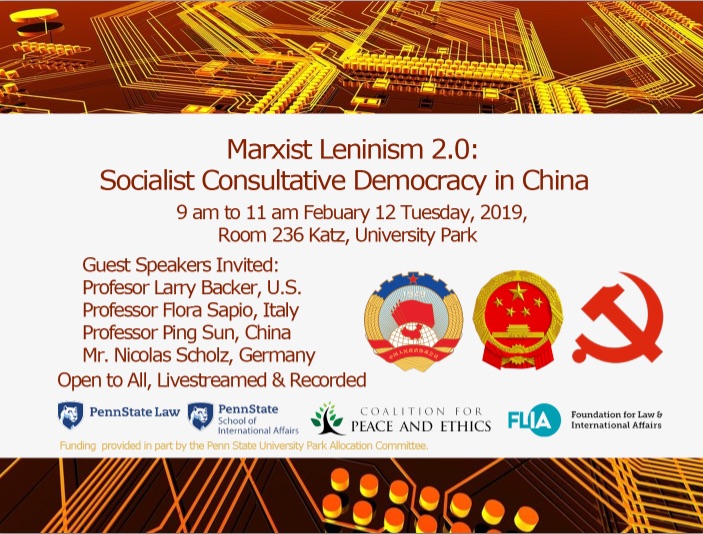
Last month I circulated information about an event I was fortunate enough to have been able to organize, a conference on comparative Marxist-Leninism and its important developments in the early 21st century (Conference Details: "Marxist-Leninism 2.0: Theory and Practice of Emerging Socialist Democracy in China and Cuba" 12 February 2019 Penn State University).
The conference brought together a marvelous group of academics from Europe, the U.S. and China to speak to issues around the new developments in China and Cuba, and their potential ramifications in areas of trade, foreign relations, globalization, and theory (especially constitutional and political theory)(Conference Concept Note). It was divided into two parts. The first was to consider the emerging structures of Chinese governance and its internal and global ramifications (Concept Note HERE). The second considered the developments of participatory democracy and engagement in Cuba around its 2018-2019 project of constitutional reform (Concept Note HERE).
Unfortunately an unanticipated snow and ice storm closed the university on the day scheduled for the event. But with great good humor and a spirit of adventure the conference participants gathered together and held the first part of the Conference-- China’s Socialist Consultative Democracy. My great thanks to Flora Sapio (Uni Naples L'Orientale), Sun Ping (East China University of Politics and Law); Nicolas Schuiltz (Ludwig-Maximilians Uni); Keren Wang (Penn State), Miaoqiang Dai (Penn State) and James Korman (Penn State) for their participation and insights.
In the process we were able to engage in a marvelously productive conversation around the work presented by each of the participants. These ranged from the history socialist consultative democracy through the CPPCC, to the current state of its operations and it challenges, to the transposition of consultative democratic practice to the Special Administrative Zones to the external ramifications of United Front work and the role of democratic centralism, to the potential for theorizing a new Leninist endogenous democracy.
Links to the Videorecording of the Panel, along with statements and PowerPoints follow below. We hope you enjoy watching the proceedings as much as we enjoyed the engagement. We are grateful to the Coalition for Peace and Ethics, the Foundation for Law and International Affairs, for helping to make this possible.
 "Socialist consultative democracy has been developed around the United
Front Parties as well as other representative institutional social
organs. It serves as a means through which popular engagement can be
institutionalized and made effective. Yet it appears to mean much more
than that—integrating most aspects of official life within a tight web
of consultation, monitoring, and review guided by the CPC. . . Contributions will seek o theorize this emerging Marxist-Leninism 2.0,
and to consider the role of key institutional actors and organs—the
CPPCC, the state institutions, and other social and political forces—as
well as their relationship to the CPC. Analysis will be undertaken from
a Chinese, Western and comparative perspective. The core object of
participants will be to seek to extract the fundamental theory and
characteristics of the emerging systems, and to point to the likely
paths to further development."
"Socialist consultative democracy has been developed around the United
Front Parties as well as other representative institutional social
organs. It serves as a means through which popular engagement can be
institutionalized and made effective. Yet it appears to mean much more
than that—integrating most aspects of official life within a tight web
of consultation, monitoring, and review guided by the CPC. . . Contributions will seek o theorize this emerging Marxist-Leninism 2.0,
and to consider the role of key institutional actors and organs—the
CPPCC, the state institutions, and other social and political forces—as
well as their relationship to the CPC. Analysis will be undertaken from
a Chinese, Western and comparative perspective. The core object of
participants will be to seek to extract the fundamental theory and
characteristics of the emerging systems, and to point to the likely
paths to further development."
Presentations:
Presentations:
Flora Sapio, University of Naples L'Orientale: Socialist Democracy in China: The Constitution of the Political-Consultative Conference PPT HERE: sapio-china-political-consultative
Sun Ping, East China University of Political Science and Law: The Nature of CPPCC: Normative or Political PPT HERE: CPPCC
Keren Wang, Penn State University and Dominic Manthey, Rhetorical Dynamics of Strategic Framing in Shaping Social Movement Personae PPT HERE: Wang_Manthey_HK
Nicolas Schultz, Preliminary Thoughts. HERE: Preliminary Thoughts 12.02. Publishing Version
Larry Catá Backer and Miaoqiang Dai: Socialist Constitutional Democracy in the Age of Accountability 问责时代的社会主义宪制民主 PPT HERE: Backer_Dai_PPTs
Presentations:
Flora Sapio, University of Naples L'Orientale: Socialist Democracy in China: The Constitution of the Political-Consultative Conference PPT HERE: sapio-china-political-consultative
Sun Ping, East China University of Political Science and Law: The Nature of CPPCC: Normative or Political PPT HERE: CPPCC
Keren Wang, Penn State University and Dominic Manthey, Rhetorical Dynamics of Strategic Framing in Shaping Social Movement Personae PPT HERE: Wang_Manthey_HK
Nicolas Schultz, Preliminary Thoughts. HERE: Preliminary Thoughts 12.02. Publishing Version
Larry Catá Backer and Miaoqiang Dai: Socialist Constitutional Democracy in the Age of Accountability 问责时代的社会主义宪制民主 PPT HERE: Backer_Dai_PPTs

No comments:
Post a Comment